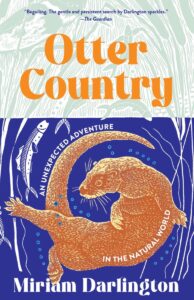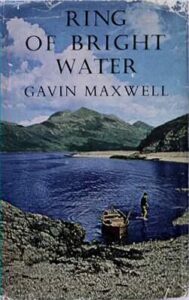
What a nearly extinct, mysterious, watery underworld wild animal teaches us (A year in search of otters in Scotland’s West Highlands; Devon, Cornwall, the Lake District, England; and West Wales): The biggest takeaway from this gorgeously written, hybrid memoir’s obsessive quest to discover the hidden world of otters is how it enriches a life, when you’re so fully immersed in the mysteries of the natural world.
You may be thinking otters? Who cares? A member of the Weasel family? Miriam Darlington’s “icon of nature conservation” will, then, take you by surprise as there’s much to learn from these creatures.
Otter Country is the kind of book that defies classification. A memoir woven into an unfamiliar animal tale mixing wildlife biology, ecology, geology, geography, chemistry (water pollution), conservation, restoration, and environmental sciences.
It’s also philosophical and meditative. A self-help book for living in the moment – as long as you’re willing to leave your comfort zone, like Darlington does time and again. Making her escapes into worlds so different than ours. You’ll feel her wanderlust to places you may want to add to your travel bucket list. Places to slow down, listen, sit in silence, daydream.
What’s amazing to a US reader is that even though the North American species of otter – one of thirteen Mustelid types – is seeing its population increasing, how many of us have ever noticed, heard, or thought about otters?
Why aren’t Americans thinking about otters, cherishing them like Darlington depicts the UK does? Otters have captivated the British for decades, leading to their protected status in the Wildlife and Countryside Act of 1981.
A remarkable, adorable, heartfelt characteristic of otters is their motherhood journey, in which her pup clings to her underbelly for as long as eighteen months. Signifying how much is needed to learn to survive their “knife edge” existence.
Otter Country is also about the meaning of a place. “Where a place has been home, has caressed our senses in a familiar embrace, carried us with its contours, nurtured us in a mutual and unspoken understanding, how do we deal with its loss?”
Literature and poetry integrated and cited often, add another dimension to the inclusive nature of what you’re reading, learning, sensing, feeling.
Prose-wise, perhaps if Darlington’s nature writing wasn’t as fetching the book wouldn’t be as inviting. What is it about people passionate about wild animals, wild landscapes, wildlife that translates into spirited writing?
Passion is the key word. Darlington’s lyrical, poetic prose reveals her passion as an award-winning poet and creative writing lecturer at the research-oriented University of Plymouth, England. She lives on the stunning, tempestuous southwestern coast of Devon, England, and has also written an acclaimed nonfiction book on owls adapted into a BBC Radio Book of the Week series.
Otters tell the story of the health of an“entire aquatic ecosystem” from a UK mindset on changing waterways as a “Living Landscape.” In describing a farm two naturalist friends turned into a conservation Trust (one of many referred to), Darlington says that, “it isn’t about people. It’s not about any of us. It’s about what we invest and leave, and what is to come.”

The author describes herself as “fixated” on otters since childhood. An early influence was her grandfather, a famous biologist and geneticist, dubbed “the man who ‘invented’ the chromosome.” His collection of science books fueled her passion for science and literature, along with her mother’s love of poetry. Factors that fed into “the longest love affair of my life”: a British children’s classic, The Ring of Bright Water, about otters and the man who’s credited with saving them from extinction, Maxwell Gladwell.
Written in 1960, it’s Maxwell’s otter book that lets us see the underpinnings of why Otter Country is a must-read for appreciating the vital force of humans bonding with animals.
Maxwell feels larger than life but his raising of otters as pets with tragic deaths raises questions. Darlington visits the stone cottage he lived in that he gave a mystical name to – Camusfearna. She also pays a visit to Jimmy Watt, one of Maxwell’s “otter-keepers,” who lost two fingers from one of these so-called “pets.”
Otters are water creatures. While sea otters are found in sea locks and oceans, most of Darlington’s tales are to remote water areas the Eurasian otter is known to inhabit – rivers, streams, pools, marshes, the “roots, peat and bog” of wetlands – with the occasional spotting of their “musky” dens or holts.
An immensely adaptable animal, “otter’s skills and beauty have been translated into some of the most captivating film, prose, and poetry ever written about a wild creature,” Darlington writes. You’ll be introduced to a good number of literary and visual art mediums.
Armed with intense curiosity, a wealth of knowledge, and preparedness for raw, unpredictable weather conditions, to the extent she can, Darlington explains that the first step is to know what you’re looking for: evidence otters have left their marks, such as droppings or “spraints” on walking paths, and acute listening for an otter’s sounds or calls like “huff” and “yikker.”
Chapter 1, “Spirit Level,” sets the tone for the otherworldly landscapes and places most of us will never traipse through. Certainly, not with the fervor and daring of the author! On one adventure, for instance, she realizes she’s entered “some of the wildest, most impassable woods I have ever seen.” Mind you she’s venturing alone, wild camping, “sleuthing,” especially at nighttime when there’s the greatest likelihood she’ll spot a rather clever, rapidly-moving, camouflaged predator hiding and disappearing in a flash.
What Darlington doesn’t know she asks, phones, meets, researches: British authors of otter books, like-minded naturalists and preservationist friends, otter experts, and intrepid souls she encounters on her numerous escapades. Welcomed everywhere, showing us how well humans connect through common passions.
Although otters are no longer hunted down for their thick, “double-layered,” valuable fur, land development has torn down their private hideaways; industries have polluted their waters, such as Cornish coal and tin mining; and the larger ocean predators. None, though, as frequently lethal as being hit by a car when dashing across a road.
Darlington’s patience is also inspiring. Willing to “spend a good amount of time finding nothing: then and only then, perhaps an ambiguous sign will turn up.”
A British artist whose passion for painting Cornwall landscapes, Kurt Jackson, reflects Darlington’s overall passion and wide-ranging account.
Maxwell’s fairy-tale invented name for his isolated homeplace is Celtic. “Celtic people, whose spirited life was rooted in stories of transformation, drew their mythology instinctively from the land and its creatures.”
A poetic way of describing Darlington’s quest for “transference” and imagination.
Lorraine